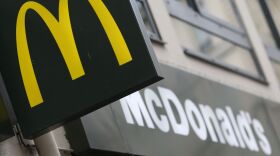
David Kestenbaum
David Kestenbaum is a correspondent for NPR, covering science, energy issues and, most recently, the global economy for NPR's multimedia project Planet Money. David has been a science correspondent for NPR since 1999. He came to journalism the usual way — by getting a Ph.D. in physics first.
In his years at NPR, David has covered science's discoveries and its darker side, including the Northeast blackout, the anthrax attacks and the collapse of the New Orleans levees. He has also reported on energy issues, particularly nuclear and climate change.
David has won awards from the American Association for the Advancement of Science, the American Physical Society and the Institute of Electrical and Electronics Engineers.
David worked briefly on the show This American Life, and set up a radio journalism program in Cambodia on a Fulbright fellowship. He also teaches a journalism class at Johns Hopkins University.
David holds a bachelor's of science degree in physics from Yale University and a doctorate in physics from Harvard University.
-
One hungry reporter goes on a quest to find out why his package of Peanut Butter M&M's weighs 0.06 ounces less than a package of Milk Chocolate M&M's.
-
How much of what we think of as the beautiful sound of a Stradivarius is the instrument itself — and how much is the brand?
-
Multiple economists have studied the fast-food industry to answer the question. They've found very different answers.
-
For decades, the Supreme Court ruled that laws regulating things like wages and working conditions were unconstitutional. That changed during the Great Depression, when one of the justices switched sides, paving the way for the Fair Labor Standards Act.
-
The U.S. exports a billion pounds of used clothes every year. Much of that winds up in used clothing markets in sub-Saharan Africa.
-
"This little baby — what my wife used to call my 'pretend money project' — is really going mainstream," says the chief scientist at the Bitcoin Foundation.
-
Two Nobel laureates disagree on a basic economic question: Is it possible to reliably spot bubbles before they burst?
-
Kenyans who received money with no strings attached started businesses and bought food for their kids, according to a new study. They didn't spend it on alcohol or cigarettes.
-
I bought a Treasury bill on Tuesday, before Congress made the debt-ceiling deal. It was unclear whether I would get paid back on time.
-
Whatever happens to a the global economy, one thing is clear: If the U.S. defaults, people all over the world who have loaned the government money won't get paid on time.









